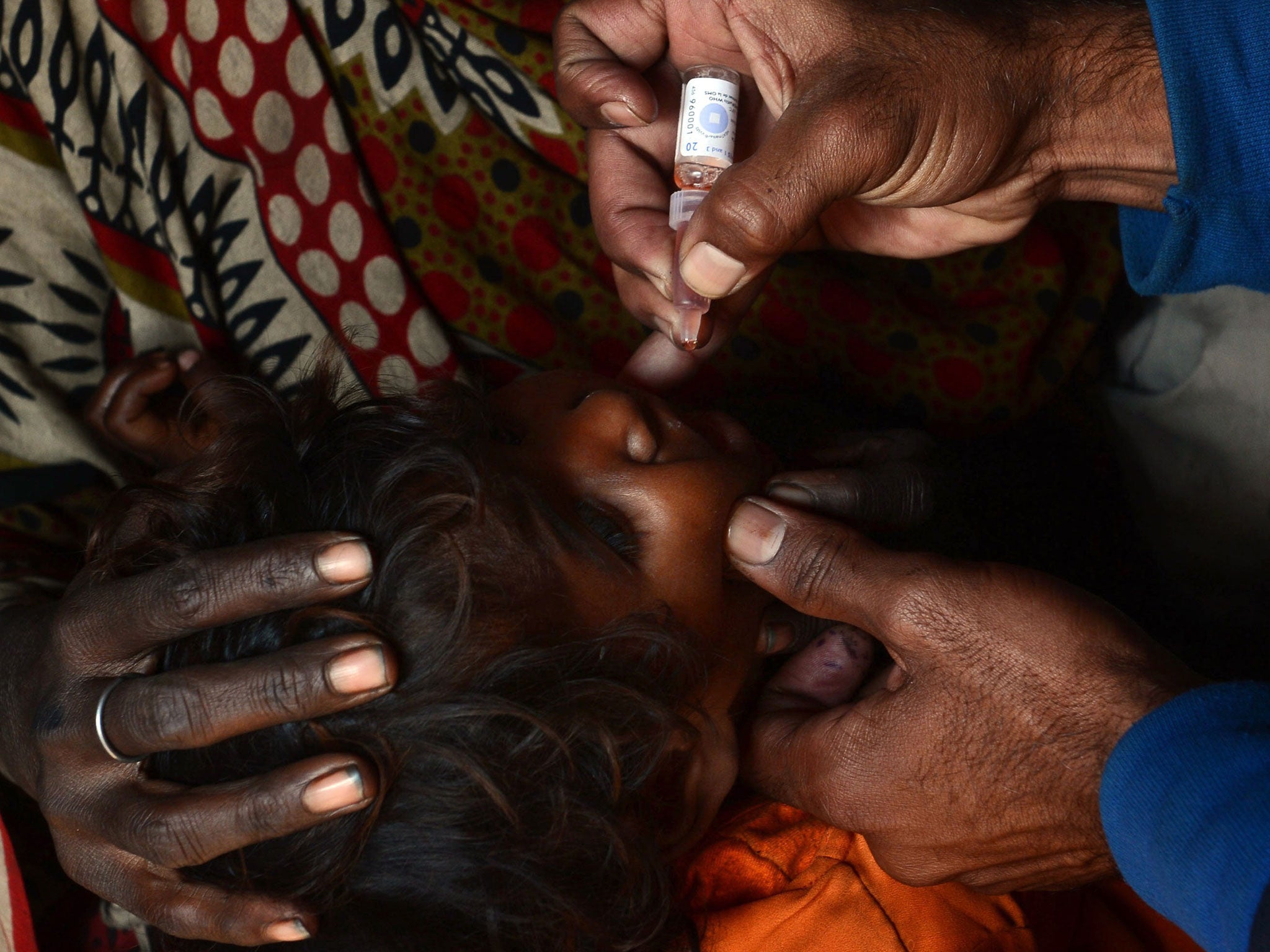Killings will not halt vaccinations, vows Bhutto's daughter
She speaks out after murder of nine health workers in Pakistan by extremists opposed to UN polio programme

Your support helps us to tell the story
From reproductive rights to climate change to Big Tech, The Independent is on the ground when the story is developing. Whether it's investigating the financials of Elon Musk's pro-Trump PAC or producing our latest documentary, 'The A Word', which shines a light on the American women fighting for reproductive rights, we know how important it is to parse out the facts from the messaging.
At such a critical moment in US history, we need reporters on the ground. Your donation allows us to keep sending journalists to speak to both sides of the story.
The Independent is trusted by Americans across the entire political spectrum. And unlike many other quality news outlets, we choose not to lock Americans out of our reporting and analysis with paywalls. We believe quality journalism should be available to everyone, paid for by those who can afford it.
Your support makes all the difference.Asifa Bhutto Zardari, daughter of President Zardari of Pakistan, yesterday defiantly vowed that the country's anti-polio campaign would continue, despite the killing of nine health workers by extremists opposed to the vaccination programme. The UN eradication campaign was partly suspended following the shootings last week in Pakistan, one of the last three countries in the world where the disease remains endemic. Speaking yesterday in London Ms Bhutto Zardari, goodwill ambassador for polio eradication, said new ways to protect health workers were being worked out and that she expected vaccinations would quickly resume. "Polio has become a high-profile issue to Pakistan's government, and extremists believe they can twist the government's arm by attacking our workers. We cannot allow these people to dictate what we can and cannot do. The polio vaccine can save millions. It is not against Islam to promote healthy children."
She said the attacks had strengthened her determination to continue. "The government has provided an increased amount of security for our volunteers, who work tirelessly to promote the health of children."
It was not clear initially who was behind the violence as many Islamists, including Taliban militants, have long opposed the campaign. Some say it aims to sterilise Muslims, others that it has been used by US intelligence as a cover for espionage. One militant commander said the programme would not continue unless attacks by US drone aircraft stopped.
But while the Pakistan Taliban have repeatedly threatened health workers involved in the campaign, and some workers said they received calls telling them to stop working with "infidels" just before the attacks, a Pakistan Taliban spokesman, Ihsanullah Ihsan, told Reuters that his group wasn't involved in the violence. However, the same group has threatened polio workers in the past, and in June they banned vaccinations in the north-western Waziristan.
Government officials say the Taliban's hostility to the campaign increased after it emerged that the CIA had used a fake vaccination campaign to try to gather information about Osama bin Laden, before he was found and killed in Pakistan last year.
The UN Secretary-General, Ban Ki-moon, called the killing of the health workers "cruel, senseless and inexcusable". Speaking at an end-of-year press conference, he said the nine murdered workers were among thousands across Pakistan "working selflessly to achieve the historic goal of polio eradication." The killings prompted the UN World Health Organisation (WHO) to suspend the vaccination drive in two of Pakistan's four provinces, which critics claimed had handed the extremists a propaganda victory.
UN officials estimate that 3.5 million children missed vaccinations this week as a result. The mission to stamp out polio had been started by Ms Bhutto Zardari's mother, Benazir Bhutto, then Pakistan's Prime Minister, who was murdered in a bomb attack in 2007. Ms Bhutto Zardari, 19, who is studying at a British university, said: "The mission was started by my mother and, until it is completed, I will devote as much time and effort as is needed." She said the eradication programme had already faced and overcome the challenge of widespread flooding, which killed more than 400 people and made thousands more homeless. "I want to make her proud and ensure that the country she loved is progressing to become a healthier Pakistan".
Ms Bhutto Zardari dismissed extremist suspicions about "Western medicine", pointing out that much of the vaccine used in Pakistan is manufactured in Indonesia, one of the most populous Muslim countries in the world. She also pointed out that countries such as Saudi Arabia, which takes large numbers of Pakistani migrant workers each year, has made it mandatory that anyone entering the country should receive polio drops. "This is a global problem and deserves global commitment," she insisted.
Pakistan had 20,000 polio cases in 1994, but vigorous vaccination efforts had brought the number down to just 56 in 2012, according to the government. The most recent figures show that Pakistan has now gone seven months without a single reported case of one of the two strains of polio found there.
Polio predominantly affects small children, in some cases paralysing the victim within a few hours. Organisations such as Unicef and the WHO have campaigned for many years to completely eliminate the disease. That campaign was boosted when the chairman of Microsoft, Bill Gates, and his wife Melinda donated more than $1bn to polio vaccinations and campaigns so far, stating that they are willing to continue the funding until the disease is totally eradicated. To date, it has been banished from everywhere except Pakistan, Afghanistan and Nigeria.
"Diseases know no borders, and mankind has a collective responsibility towards the children of the world, and together we must strive to ensure that tomorrow's world is free of this scourge," Ms Bhutto Zardari said.
Join our commenting forum
Join thought-provoking conversations, follow other Independent readers and see their replies
Comments